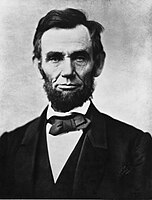
National Union Party (United States)
The National Union Party was the name used by the Republican Party and elements of other parties for the national ticket in the 1864 presidential election during the Civil War. Most state Republican parties did not change their name.[1] The name was used to attract War Democrats, border state voters, and Unconditional Unionist, and Unionist Party members who might otherwise have not voted for Republicans. The National Union Party nominated incumbent Republican President Abraham Lincoln of Illinois and Democrat Andrew Johnson of Tennessee for Vice President. They won the Electoral College 212–21.
Not to be confused with Constitutional Union Party (United States).
National Union Party
May 21, 1864
November 3, 1868
Republican Party
Unionist Party
Unconditional Union Party
War Democrats
Radical Democracy Party (after September 1864)
Changing mood[edit]
The complexion of the war changed as the election approached. Confederate Commander Robert E. Lee's last victory in battle occurred June 3, 1864 at Cold Harbor. Union General Ulysses S. Grant's aggressive tactics trapped Lee in the trenches defending Richmond. Admiral David Farragut successfully shut down Mobile Bay as a Confederate resource in the Battle of Mobile Bay on August 3–23, 1864. Most decisive of all, Union General William Tecumseh Sherman captured Atlanta on September 1, 1864, convincing even the pessimists that the Confederacy was collapsing.[6]
Frémont withdraws[edit]
Frémont and his fellow Republicans hated their former ally Postmaster General Montgomery Blair. Frémont, aware that his candidacy could result in victory for the Democrats, made a deal to drop out of the presidential race in exchange for Blair's removal from office. On September 22, 1864, Frémont dropped out of the race. On September 23, Lincoln asked for and received Blair's resignation.[7][8][9]
The National Union ticket went on to win handily in the election of 1864, defeating the Democratic ticket of former Union General George B. McClellan (whom Lincoln had previously relieved of his command) and Representative George H. Pendleton from Ohio.

